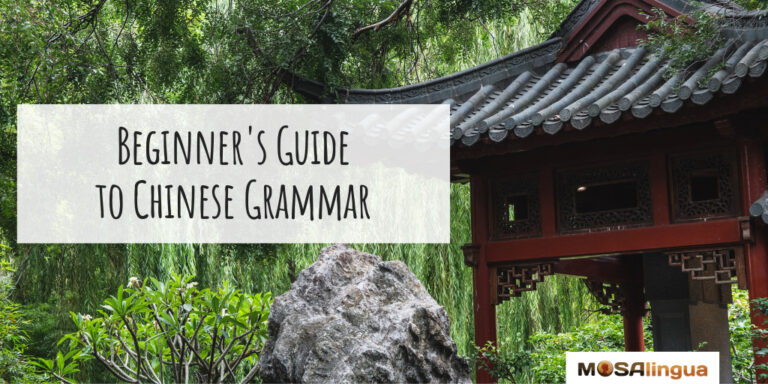For native English speakers, learning Chinese can seem like a difficult goal. But did you know that Chinese grammar is easy compared to English grammar? You just need to adjust to a different frame of reference. This guide to Chinese grammar is specially designed to help beginners ease their way into the language.

Chinese Grammar: A Beginner’s Guide
Why Chinese Grammar Is Easier than You Might Think
Chinese has a reputation for being difficult to learn. But did you know that most of the challenge lies in pronunciation?
Grammar, on the other hand, is pretty straightforward. It’s actually one of the easiest aspects of the language. No conjugation, no genders, no declensions… in this regard, Chinese is actually easier than French or German, for example.
You just have to get used to structuring sentences a little differently, because it’s pretty different from English in that regard. But here, too, it’s easy once you get a feel for it!
📍 A quick note before we get started – in this beginner’s guide, we’ve spaced characters out from one another. If you read a document in Chinese, you’ll notice that there are no spaces between the characters. Here, we’re just trying to help you visualize the details and learn the characters thoroughly.
No conjugation
Certain languages (like French, for example) have conjugation groups. And in pretty much all Indo-European languages, conjugation is a fundamental part of the way the language is structured. With Mandarin, though, there’s no need to worry about this. The verb will always stay in the same form, no matter who or what is acting.
There is no gendering of nouns, either, nor are there grammatical cases, like the accusative or dative cases (you’ll run into these in German or Russian, for example). Sounds easy, right?
Start improving your Chinese today
Good news: we can help!
More good news: you can get started for free! With your free trial, you can test drive the most effective way to learn Mandarin Chinese for the next 15 days!
Vocabulary flashcards, videos with subtitles, audiobooks, articles adapted to your level – with MosaLingua Premium (Web & Mobile), you’ll have access to all this and more. Get started right now. It’s free—and risk-free—to try!
No grammatical tenses
As we said before, the verb does not change. A verb is generally made up of one or two characters, and never changes its form. A differently formed character changes the meaning entirely.
For example: 江 jiāng (river) and 汪 wāng (pond).
Here, the characters have lots of visual similarities, and the meanings are somewhat related – but they are definitely two distinct ideas. So you’ll never have to alter a character to change its grammatical form.
So then how do you talk about the past, present, or future in Chinese? Well, it’s actually pretty easy. Special characters indicate which tense is being used:
- 了 (le) is most commonly used to talk about the past,
- 要 (yào) and 会 (huì) are modal expressions that indicate an intention or desire – they are used to talk about the future,
- there is no additional character used in the present tense.
Simple sentence structure
Chinese grammar structures are relatively easy, as well, and pretty similar to English. At least in terms of the basics: Subject + Verb + Object. This order is constant, even in questions. In fact, you’ll never see a verb come before a subject.
For example, to ask “Are you American?” you would say 你是法国人吗?(nĭ shì fǎguórén ma?): Subject + Verb + Object + Interrogative pronoun.
The other words that might be added, like adjectives, adverbs, or particles, can have different locations, but the sentence will keep the same basic structure.
When Should I Start Learning Chinese Grammar?
There is no correct answer to this question. Some learners will prefer to put this off as long as possible, while others like to know more early on. It’s a personal preference.
It seems that the most effective approach is to start to practice Chinese grammar when you get to the point where you’re reading and building sentences. You’ll need to have learned some vocabulary before this point, but don’t put it off for too long, or else you’ll risk holding yourself back. Even if Chinese grammar is fairly uncomplicated, it’s still quite different from what you’re used to.
Our best advice is that you start learning Chinese grammar little by little, as you need it. This will help you continue to make progress, but not get bogged down with theory. If you learn a grammar rule that you never come across in your studies or daily life, you’re much more likely to forget it. So at this point, just limit your scope to the things that you’ll use on a regular basis.
Chinese Grammar Sheets
Don’t be afraid – let’s dive into the basics of Chinese grammar together!
How to construct a sentence
Chinese sentences can look very different from English. There are many different sentence structures to be aware of. Here are a few rules that can help you decode Chinese sentences and improve your speaking:
- implied verb: Subject + Adjective / Adverb
Example: 我很忙 wǒ hěn máng – I’m busy / 我 很 好 wǒ hěn hǎo – I’m well - “standard”: Subject + Verb + Object
他 吃 面 包。tā chī miànbāo – He eats some bread - adverbial phrase of time: Subject + Adverbial phrase of time + Complement of place + Object
我 昨天 在 家 吃 披萨 wǒ zuótiān zàijiā chī pīsà – Yesterday, I ate some pizza at home.
Negation with 不 and 没
The idea of negative sentences is simple enough.
Here, we’re going to show you how to make negative sentences even easier with 不 (bù) and 没 (méi). The main difference between these words is that 没 is used with 有 (yǒu) and 不 is used with all other verbs.
没 (méi)
This character is mainly used with 有 in the present and future tenses, which looks like:
- I don’t have any money – 我 没 有 钱 (wǒ méi yǒu qián)
没 is also used in negative sentences in the past tense:
- I did not eat breakfast – 我 没 吃 早 饭。(wǒ méi chī zǎofàn)
If we used 不 in the last sentence (我 不 吃 早 饭。- wǒ bù chī zǎofàn), the meaning would become “I do not eat breakfast.” So, the meaning would change from a single past action to a habitually repeated action. In this case, 没 indicates that we’re talking about one event in the past (this morning).
不 (bù)
不 is used with verbs and adjectives. Later, as you learn more about Chinese grammar patterns, you’ll see that negation using 不 can be more complex. But for this beginner’s guide, we’re only going to worry about the basics. So here’s how to construct a sentence using 不: Subject + 不 + Verb / Adjective (+ Adverb).
Here are a few examples:
- I am not Chinese – 我 不 是 中 国 人 。(wǒ bú shì zhōng guó rén)
- He is not a student – 他 不 是 学 生 。(tā bú shì xuéshēng)
- I do not know – 我 不 知 道 。(wǒ bù zhīdao)
You can also use 不 in the future tense:
- Tomorrow, we will not go to Beijing, we will go to Shanghai –
明 天 我 们 不 去 北 京 , 我 们 去 上 海 。(míngtiān wǒmen bú qù Běijīng, wǒmen qù Shànghǎi)
Difference between 二 and 两
二 (èr) is used to refer to numbers under 100. For example:
- 我 二十七 岁 (wǒ èr shí qī suì) – I am 27 years old
- 二 楼 (èr lóu) – the second floor
两 (liǎng) is used for “two” when indicating quantity, and also to refer to numbers over 100. It will always come before a classifier.
- two books – 两 本 书 (liǎng běn shū)
- 两 天 (
- 2,000 – 两 千 (
Note: to say “two hundred,” you’ll either use 二, or 两 to indicate the “2.” Either can refer to this number.
Classifiers in Chinese grammar
In Chinese, there are characters that are added before a noun in a sentence. They don’t really have a translation, but they are called “classifiers” (or sometimes “measure words“). As their name suggests, they serve to classify nouns within a category.
Think of it like the words we use in English to designate a specific item: a glass of water, a bottle of wine, a slice of bread. In Chinese, these are used for everything, so there are more than a hundred of them!
But don’t worry, you don’t need to memorize them all right away. The one that you ABSOLUTELY should know is 个 gè. This is the most commonly used classifier, and you can generally use it for anything. However, if you want to impress anyone with your Chinese grammar skills, here is a list of the 10 most common classifiers:
| Character | Pinyin | Use | Example |
|---|---|---|---|
| 个 | gè | people | 一 个 朋友 |
| yí ge péngyou | |||
| a friend | |||
| 张 | zhāng | flat objects (tickets, beds, etc.) | 两 张 火车票 |
| liǎng zhāng huǒchē piào | |||
| two train tickets | |||
| 本 | běn | objects with pages (books, etc.) | 三 本 书 |
| sān běn shū | |||
| three books | |||
| 杯 | bēi | cups, glasses | 一 杯 茶 |
| yī bēi chá | |||
| a cup of tea | |||
| 瓶 | píng | bottles | 一 瓶 水 |
| yī píng shuǐ | |||
| a bottle of water | |||
| 条 | tiáo | long and skinny objects and animals | 两 条 鱼 |
| liǎng tiáo yú | |||
| two fish | |||
| 只 | zhī | most other animals | 一 只 狗 |
| body parts that come in pairs (hands, ears, etc.) | yī zhī gǒu | ||
| a dog | |||
| 块 | kuài | parts, pieces | 一 块 蛋 糕 |
| yí kuài dàn gāo | |||
| a piece of cake | |||
| 片 | piàn | slices, flat surfaces | 一 片 面包 |
| yí piàn miànbāo | |||
| a slice of bread | |||
| 辆 | liàng | vehicles with wheels (excluding trains) | 一 辆 车 |
| yī liàng chē | |||
| a car |
One word of advice: rather than only learning the character for “river,” also make note of the classifier that accompanies it. It’s not uncommon to be able to use multiple classifiers with a given noun. It’s up to you whether you want to learn them all, or if you just want to focus on the most common. For example:
- a river – 一 条 河 (yī tiáo hé)
- a dog – 一 只 狗 (yī zhī gǒu) OR 一 条 狗 (yī tiáo gǒu)
Personal pronouns
Learning personal pronouns is likely to be another of the easier aspects of the Chinese language.
Here are three tips to help you learn them quickly:
- “He” and “she” sound the same in Mandarin. So you only need to learn one pronunciation. Do be sure to learn the two different characters though, as they are not written the same way!
- Only learn the three first-person singular pronouns, plus the marker for plural: 们 (men).
- To form the plural, use the singular pronouns and just add the plural marker.
| Translation | Character | Pinyin |
|---|---|---|
| I, me | 我 | wǒ |
| you | 你 | nǐ |
| he, him / she, her | 他 / 她 | tā |
| we, us | 我们 | wǒ men |
| you (plural) | 你们 | nǐ men |
| they (m) / they (f) | 他们 / 她们 | tā men |
More good news: that’s all there is to it! There’s no need to learn how to say me / my / etc., because you’ll just use the character corresponding to the person you’re talking about. For example:
- I love you – 我 爱 你 (wǒ ài nǐ)
- Your dog – 你 们 (的) 狗 (nǐmen (de) gŏu)
Talking about possession
In English, you need to worry about subject-verb agreement, but it’s a little less complicated in Chinese. You just need to use the appropriate personal pronoun + 的 (de). You’ll even notice that native speakers drop the 的 when referring to their parents, pets, or something that’s very close. This particle indicates distance. For example:
- 我的书 (wǒ de shū) – my book (something you own personally)
- BUT 我 的 老 师 (wǒ de lǎoshī) – my professor
If you have any doubt, just always use 的. At least in the beginning!
Chinese tenses: past, present, and future
First, remember that there’s no verb conjugation in Mandarin. So you won’t have to worry about different endings, declensions, or other tricks.
However, there are a few characters that you’ll need to know in order to differentiate the past, present, and future tenses. Of course, we’re not going to go too deep into specifics here, but in this beginner’s guide, we’ll share a few of the primary building blocks for making sentences. What’s more, you can also use adverbial phrases of time to talk about the past or near future (yesterday, tomorrow, etc.).
The past
There are several words that you can use to refer to the past. The most common, which typically indicates a change of state, is 了 (le).
- I went to Beijing – 我 去 了 北 京 (wǒ qù le Běijīng)
On the other hand, we do not use 没 and 了 in the same sentence. Rather, 没 will stand alone in this type of negative sentence.
- I did not speak to him – 我 没 跟 他 说 (wǒ méi gēn tā shuō)
Here, it’s implied that “I” have never spoken to him.
But be careful! This character is not only used in the past tense.
- 我 病 了。(wǒ bìng le) – I am sick. (I wasn’t sick before, but I am today.)
The second way to talk about the past is to use 过 (guò), which indicates an action that has already been completed in the past.
- Have you already been to Beijing? – 你 去 过 北 京 吗? (nǐ qù guo běijīng ma?)
- I did not tell him – 我 没 跟 他 说 过 (wǒ méi gēn tā shuō guò)
The present
Sentences in the present tense are fairly easy to construct. As we’ve mentioned, you only need to use the character and verb of your choice, and the sentence is already in the present. You can see in the following examples that the character doesn’t change:
- I eat meat – 我 吃 肉 (wǒ chī ròu)
- I drink water / I drink a glass of water – 我 喝 杯 水 (wǒ hē bēi shuǐ)
The future
The first possibility is, as in many other languages, to use temporal phrases like “tomorrow,” “next week,” “next year,” etc.
- I will come see you next month – 我 下 个 月 来 看 你。(wǒ xià ge yuè lái kàn nǐ)
You can also use 要 (yào) to express the near future (the equivalent of “I’m going to…”):
- I’m going to go to Beijing – 我 要 去 北 京。(wǒ yào qù běijīng)
To express a strong likelihood, you can use 会 (huì). When you know that something is going to happen, within a degree of certainty, for example:
- They will not be at home tomorrow – 他 们 明 天 不 会 在 家 (tāmen míngtiān bù huì zài jiā)
Here, it’s possible to leave out 会, but then the sentence would lose the sense of “I’m almost certain that they won’t be there.”
Important verbs
These verbs are equivalent to our auxiliary verbs. They come in very handy in conversation, so it’s good to be aware of them and to add them to your toolbox!
| English | Character | Pinyin |
|---|---|---|
| to have, there is | 有 | yǒu |
| to be | 是 | shì |
| to be at | 在 | zài |
| to want | 要 | yào |
| to wish, to think | 想 | xiǎng |
| may (permission) | 可以 | kě yǐ |
| to be able to (know how) | 会 | huì |
| can (possibility) | 能 | néng |
Interrogative pronouns
Questions are inevitable, no matter what language you’re learning. And these are probably some of the most important words/characters for naturally curious people to know!
Yet another thing that might surprise you by its simplicity – interrogative words are generally placed where the answer would go within the sentence. For example, the question “Who are you?” is constructed “You are who?” So you’ll simply replace the question word with the response: “I am Alex.”
Have a look at the table below and the following examples to clear up any confusion.
| English | Character/Expression | Pinyin |
|---|---|---|
| what | 什么 | shénme |
| which | 哪 | nǎ |
| who, whose | 谁 | shéi |
| when | 什么时候 | shénme shíhòu |
| where | 哪儿 / 哪里 | nǎ’er / nǎlǐ |
| why | 为什么 | wèishéme |
| how | 怎么(样) | zěnme(yàng) |
| how much, how many | 几 (<10) | jǐ |
| 多少 (>10) | duōshǎo |
Who
- Who are you? – 你 是 谁? (nǐ shì shéi?)
I am Li Wang. – 我 是 莉 王。(wǒ shì Lì Wáng)
- Whose book is this? – 这 是 谁 的 书? (zhè shì shéi de shū?)
It’s my friend’s book. – 这 是 我 朋 友 的 书。(zhè shì wǒ péngyǒu de shū)
What
- What is this? – 这 是 什 么?(zhè shì shénme?) / 这 些 是 什 么 ?(zhèxiē shì shénme? – plural)
It’s a book. – 这 是 一 本 书。(zhè shì yī běn shū)
They are photos. – 这 些 是 照 片。(zhèxiē shì zhàopiàn) - What movie are you watching? (→ What are you watching?) – 你 在 看 什 么 电 影?(Nǐ zài kàn shénme diàn yǐng?)
I’m watching a Chinese movie, Hero. – 我 在 看 一 部 中 国 电 影, 英雄。 (wǒ zài kàn yī bù zhōng guó diàn shì, yīng xióng)
When
- When are we eating? – 我 们 什 么 时 候 吃 饭?(wǒmen shénme shíhou chī fàn?)
We’re eating at noon. – 我 们 十 二 点 吃 饭 。(w - When are you coming to Shanghai? – 你 什 么 时 候 来 上 海?(nǐ shénme shíhòu lái Shànghǎi?) 你 什 么 时 候 来 上 海?
I’m coming to Shanghai tomorrow. – 我 明 天 来 上 海。(wǒ míngtiān lái Shànghǎi.)
Where
- Where are you? – 你 在 哪 儿?(nǐ zài nǎ’er?)
I am in Beijing. – 我 在 北 京。(wǒ zài Běijīng) - Where are you going? – 你 去 哪 儿? (nǐ qù nǎ’er?)
I’m going to work. – 我 去 工 作 。(wǒ qù gōngzuò)
Note: 哪 儿 is more commonly used in northern China, particularly in Beijing, while 哪 里 is more often used in the south.
Why
“Why” is a little different. In Chinese 为 什 么 (
- Why do you study Chinese? – 你 为 什 么 学 中 文?(n
Because I like Chinese. – 因 为 我 喜 欢 中 国 。( - Why are you unhappy? – 为 什 么 你 不 高 兴 ?(wèishénme n
How
- How are you going to China? – 你 怎 么 去 中 国?(n
- How do you know how to speak Chinese? – 你 的 汉 语 说 得 怎 么 样?(nde hànyǔ shuōde zěnmeyàng?)
How many, How much
- How many children do you have? – 你 有 几 个 孩 子 ? (nǐ yǒu jǐ gè háizi?)
I have four children. – 我 有 四 个 孩 子。(wǒ yǒu sì gè háizi.) - How many days are there in a year? – 一 年 有 多 少 天?(yī nián yǒu duōshǎo tiān?)
In a year, there are 365 days. – 一 年 有 365 天。(yī nián yǒu 365 tiān.)
Note: You’ll find that many Chinese speakers write numbers in numerical figures rather than characters. So don’t be surprised if you see either of these forms.
Other question words
吗
吗 (ma) means something like “is” or “are.” It’s common in yes/no questions:
- Are you a teacher? – 你 是 老 师 吗?(nǐ shì lǎoshī ma?)
- Are you drinking coffee? – 你 喝 咖 啡 吗? (nǐ hē kā fēi ma?)
呢
In a question, 呢 (ne) often means “what about…?” / “and… ?”:
- I’ve eaten. And you? – 我 吃 饭 了。你 呢 ?(w
- I’d like some tea, and you? – 我 想 喝 茶,你 呢?(wǒ xiǎng hē chá, n ne?)
- How is your father doing? And your mother? – 你 爸 爸 好 吗?你 妈 妈 呢 ?(n
Questions with 不
In Mandarin, there are not individual words for “yes” or “no.” Instead, you’ll often respond with a verb or adjective to say yes, or with 不 + verb / adjective to say no. Also, asking questions with 不 is kind of similar to our “…isn’t that right?” in English.
Let’s have a closer look:
- Do you want to eat? – 你 要 不 要 吃 饭 ?(nǐ yào bù yào chī fàn?)
Yes. – 要 (吃 饭) (yào (chī fàn))
No. – 不 要 (bù yào) - Is it big (or not)? – 高 不 高 ?(gYes. – 高 (g
Learn Chinese in Context with MosaLingua Premium (Web & Mobile)
Of course, there’s a lot more to the language than what we’ve covered in this beginner’s Chinese grammar guide. But now you have a good idea of some of the basics to start writing and using Chinese correctly in context. We hope that this will be a strong and useful foundation for you!
MosaLingua Premium is a great way to learn more vocabulary and get access to more resources.
On MosaLingua Premium, you can add new vocabulary to your app, use and learn vocabulary in context, and access a multimedia library with videos, music, and more. We’re always adding new content.
And don’t forget that you’re also part of a community of language learners, which can be a great source of encouragement and motivation as you learn!
Next Steps
Here are a few other articles that might be useful:



![The Present in English | English Grammar Hacks [VIDEO]](https://www.mosalingua.com/en/files/2018/01/1-300x169.png)



Comments